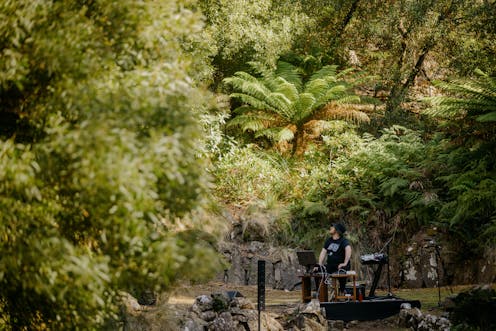
Mona Foma has returned to Launceston. As always, the festival offers a diverse program of contemporary art, design, music and performance, and works that sit somewhere between. There will be bands, there will be lasers, and there will be queer woodchopping.
But this year’s program kicks off somewhat quietly (though no less powerfully) with contemplative works that inspire a sense of connection, and an examination of the embodied practices we share in.
Meditations and immersions
Like many, my own “Mofo” experience begins with the first of the program’s Morning Meditations – a daily series of immersive sound and music performances, held in the quaintly named Fairy Dell at the Cataract Gorge.
Travelling to the site by chairlift sets the transcendental tone of what is to come. After floating across the expansive grandeur of the Gorge basin, to then sit in the soft, mossy dirt of the dell brings a sensory shift into a space of intimate relation. With other audience members, and with the site itself. We are surrounded on three sides by man ferns and Eucalypts, from which a number of birds (including the Gorge’s resident peacocks) are calling.
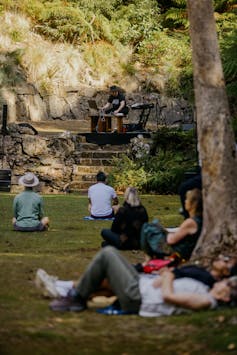
Musician and producer Reuben Lewis begins his set with a deep, tonal synth that seems to resonate off the natural stone architectures beyond the trees.
The performance is an hour-long sonic journey through layers of ethereal synth and field recordings, mixed with live trumpet and sampled spoken word. The voice is that of Tony Yap – dancer, philosopher, and Lewis’ long-term collaborator – directing us to listen, and to feel.
The birds are a constant accompaniment, as is the distant sound of shifting waters in the Gorge below. Looking around the audience, I see two women practising slow yoga, while others sit in meditative, cross-legged poses. Morning Meditations lives up to its name.
A returning chairlift ride away is underwater sound installation Floors of Heaven, by UK producer Leon Vynehall.
Presented in the outdoor public swimming pool within the basin of the Gorge, the audience is invited to literally immerse themselves in sound – sky above, sound below.
When I first enter this work, I join others in hooking my feet under the bar that runs the edge of pool, allowing me to float without risk of drifting into the path of lapping swimmers and cannonballing kids.
It takes a moment to adjust my ears to the surprisingly quiet sound piece – a 45-minute, ambient track of high synths, percussive sounds, sonar beeps and a voice reciting numbers in a non-linear fashion, as if counting you in and out of a hypnotic state.
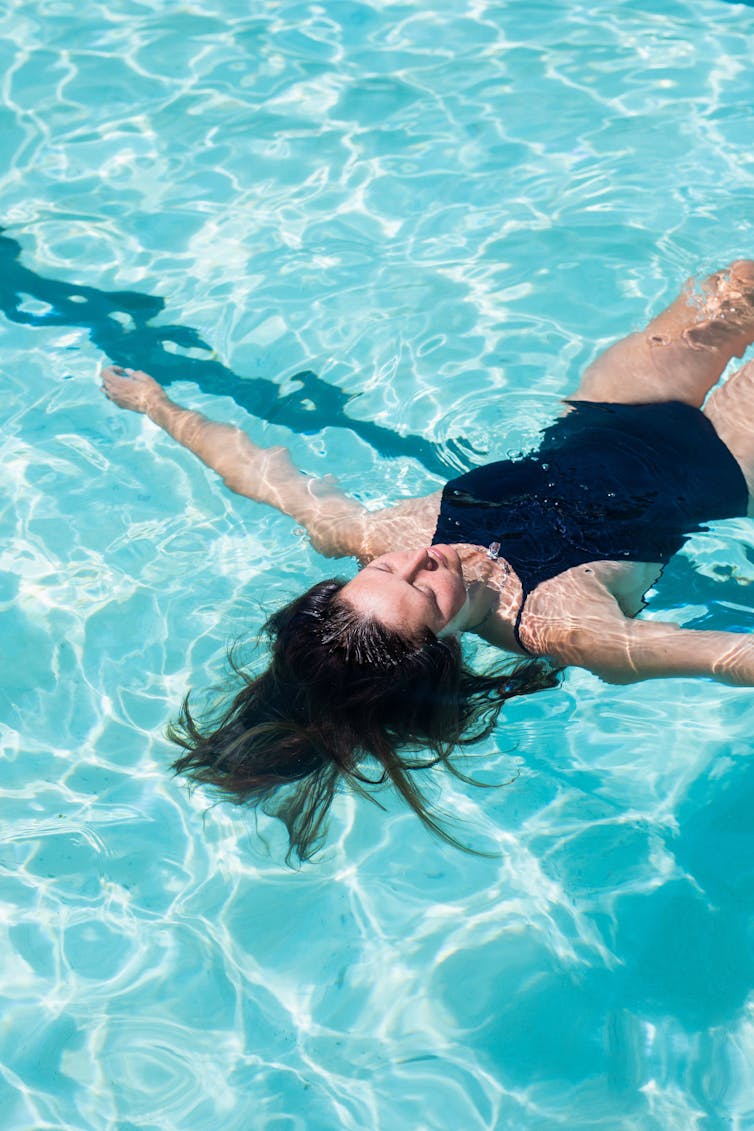
Its low volume asks you to attune your body to the work. In doing so, you attune to your own body as well. With ears submerged, the internal sound of your breath becomes amplified and merges with Vynehall’s sound piece. An occasional vibration is felt, as a particular tone within the work finds resonance in your chest. Eventually I let go of the bar and allow my body to be moved by the motion of other bodies, drifting in the sound waves and wakes of fellow listeners.
Floors of Heaven was originally commissioned for the 2022 Sydney Festival, where it was accompanied by dramatic lighting and accessed via a healthily priced ticket. In contrast, Mona Foma presents this work as a subtle intervention: without the spectacle of coloured lights, or exclusionary ticketing, and with minimal signage announcing its presence. For this, the experience is all the more intimate, encouraging us to find moments of quiet attunement in our everyday lives.
Read more: It's not all in your mind: how meditation affects the brain to help you stress less
Ritual encounters
Across town, Chloe Kim has been drumming since 7am, having begun her multi-sited durational performance 100 Hours, which sees her solo drumming for ten hours each day of the festival.
When I later catch a glimpse of Kim’s performance at the Old Tafe Building, she sits at her drumkit with eyes closed. The rhythmic motion of her limbs is graceful and light, showing no sign of tiring from the eight and a half hours of drumming she has already performed. I see in her face a mirror image of those audience members’ faces I’d seen at Morning Meditations – it is the same transcendental state, just arrived at by other means.
In his 2008 book Outliers, Malcolm Gladwell wrote “ten thousand hours is the magic number of greatness”, arguing that it takes this great amount of practice to master an instrument or craft. While this has since been debunked, Gladwell’s argument highlights the rituality of sustained and committed deep practice.
A musician’s practice shares an affinity with religious and spiritual practices – each a dedication of time, extended repetition and a giving over to something else. With time, the body knows and moves without conscious direction.
In 100 Hours, Chloe Kim transforms this practice into performance so we might also share in the ritual. My only advice: consider wearing earplugs.
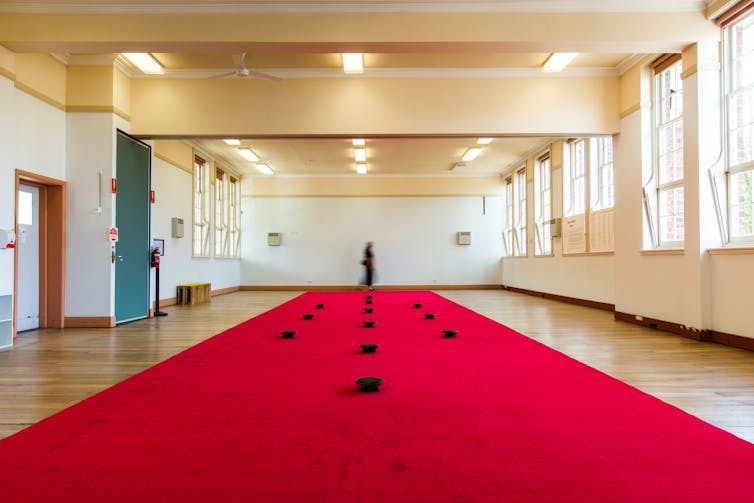
Read more: Why rituals have been crucial for humans throughout history – and why we still need them
A corridor away from Kim’s performance, the invitation into ritual is all the more present in James Webb’s sound installation, Prayer. Even before opening the door to the work, I can hear the sounds of worship – singing, speaking, chanting – which become a loud cacophony as I enter the room.
Twelve speakers are positioned in a symmetrical pattern on the floor, atop a large red carpet. Each speaker plays a different recording of prayer, gathered from individuals of various faiths from around the state. The combined sound swells and recedes, with moments of resonance, clarity, and dissonance between the many voices and melodies.
At first, there seems to be a disjunction between the sacred sounds and the utilitarian space the work is presented in – an old classroom with fluorescent lights, beige walls and off-pink trims of many leftover-paint, bottom-of-the-can shades. Upon instruction, I remove my shoes and step onto the carpet, slowly weaving my way between the speakers and occasionally kneeling for a closer listen. This is the power of the work: in shaping your body into gestures of worship, a bow or a kneel, its call into ritual is embodied. Prayer asks that you humble yourself before you can appreciate its depth.
As I kneel, I reconsider the architecture around me. Reverence doesn’t require beauty. It is the work of daily life. A man sitting beside a speaker not far from me raises his fingers to his lips, kisses them and bows his head. Here, in a former classroom, Webb facilitates a process of learning and understanding through shared embodied experience, asking us to consider the connections (within difference) between us all.
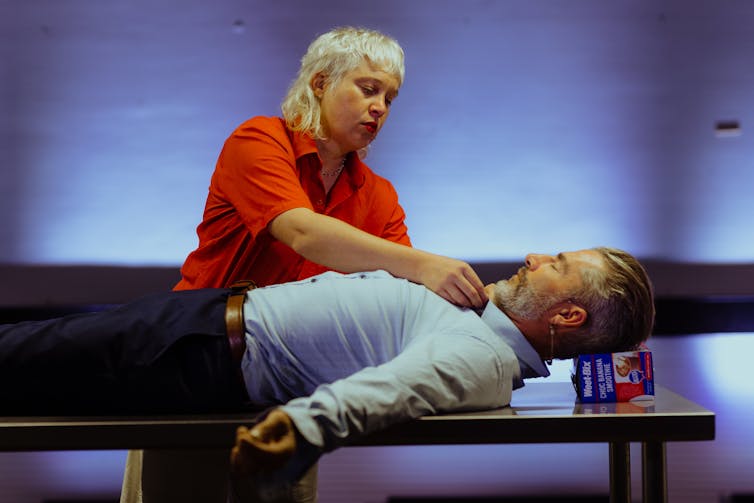
Elsewhere in the program I encounter The Director, a performance from artist Lara Thoms and ex-funeral director Scott Turnbull. It takes its audience on a hilarious and heart wrenching journey through the unspoken rituals of death, cremation, and ceremony preparation. I find Jenni Large’s Body Body Commodity to be a brilliant and confronting dance and sound performance that comments on the commodification of the female body.
Mona Foma has a reputation for hosting strange and exciting works that push the boundaries of viewers’ understanding of contemporary arts. But there is always a critical conversation occurring beneath the colourful surface.
This year, the conversation has begun with introspective questions around connection, communal experience and embodied practices. With the festival continuing in Hobart this week, I recommend you feel your way through.
Read more: David Walsh's MONA and the cultural regeneration of Hobart
Hannah Foley does not work for, consult, own shares in or receive funding from any company or organisation that would benefit from this article, and has disclosed no relevant affiliations beyond their academic appointment.
This article was originally published on The Conversation. Read the original article.







